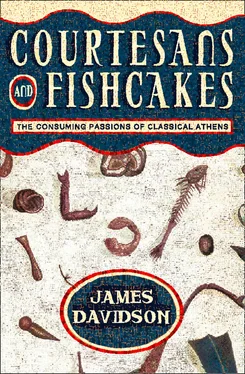‘But if you go to the prosperous land of Ambracia and happen to see the boar-fish, buy it! Even if it costs its weight in gold, don’t leave without it, lest the dread vengeance of the deathless ones breathe down on you; for this fish is the flower of nectar.’ The Greeks were fond of fish. Fondness, on second thoughts, is rather too moderate a word for such a passion. What the literature of pleasure manifests, time and time again, is something rather more intense, a craving, a maddening addiction, an indecent obsession. The flavour of this yearning is easily sampled in the work of Archestratus of Gela in Sicily, from whom the eulogy of the boar-fish is taken. Another passage from the same work advises readers on what to do if they come across a Rhodian dog-fish ( émissole ?): ‘It could mean your death, but if they won’t sell it to you, take it by force … afterwards you can submit patiently to your fate.’ 3 Конец ознакомительного фрагмента. Текст предоставлен ООО «ЛитРес». Прочитайте эту книгу целиком, купив полную легальную версию на ЛитРес. Безопасно оплатить книгу можно банковской картой Visa, MasterCard, Maestro, со счета мобильного телефона, с платежного терминала, в салоне МТС или Связной, через PayPal, WebMoney, Яндекс.Деньги, QIWI Кошелек, бонусными картами или другим удобным Вам способом.
Archestratus acquired a certain amount of notoriety for his mock-heroic hexameters rhapsodizing food, but his work, variously known as Gastronomy, Dinnerology or The Life of Luxury , was by no means untypical of the discourse of gourmandise. What should be noted is not so much the extravagance of the language used to describe the fish, as the fact that in a work about the pleasures of eating in general, reference is made to almost nothing else. The Greeks, to be sure, recognized as delicacies some foods which had nothing to do with the sea: some birds and other game (especially thrushes and hares), various sausages and offal (sow’s womb was particularly revered), some Lydian meat stews and various kinds of cake, but these were exceptions. The edible creatures of the sea seem to have established a dominance over the realm of fine food in classical Greece that scarcely fell short of a monopoly.
It is hard to say who it was who first put the marine into cuisine. The invention of the sumptuous ‘modern’ style of cookery was usually traced back to the Sicilians or their neighbours across the straits, the people of Sybaris on the instep of Southern Italy. The latter were defeated by their neighbours in 510 and their city was razed to the ground, but stories of their fabulous riches were still being told at Athenian dinner-parties one hundred years later. One historian recorded a Sybaritic law that gave inventors of new dishes a year’s copyright (perhaps, says one modern commentator, the earliest patent known). Moreover, he claimed there was a special dispensation that eel-sellers and eel-fishers should pay no tax. In about 572, Smindyrides, distinguished even among the Sybarites for his decadence, had made a great impression when he came over to mainland Greece to seek the hand of the daughter of Cleisthenes the ruler of Sicyon near Corinth. Fearing that the motherland might not be up to his standards, he brought with him one thousand attendants, consisting of fishermen, cooks and fowlers. 4 Конец ознакомительного фрагмента. Текст предоставлен ООО «ЛитРес». Прочитайте эту книгу целиком, купив полную легальную версию на ЛитРес. Безопасно оплатить книгу можно банковской картой Visa, MasterCard, Maestro, со счета мобильного телефона, с платежного терминала, в салоне МТС или Связной, через PayPal, WebMoney, Яндекс.Деньги, QIWI Кошелек, бонусными картами или другим удобным Вам способом.
Fish also seems to have been very prominent in the culinary culture of Sicily. According to one source they called the sea itself ‘sweet’ because they so enjoyed the food that came out of it. Athenaeus tells us of a fish-loving painter from Cyzicus, Androcydes, who painted the sweet fare of these sweet waters in enthusiastic and luxurious detail when depicting a scene of the multiheaded monster Scylla in the early fourth century; we should, perhaps, view the numerous ancient mosaics of marine life with the same perspective we now bring to Dutch flower-paintings, not as cerebral studies in realism, but as loving reproductions of desirable and expensive commodities. The comic poet Epicharmus, who worked in Syracuse, the island’s greatest and richest city, at the beginning of the fifth century, seems to have been preoccupied with sea-food, judging from the surviving fragments, although later writers were not always sure what he was referring to: ‘According to Nicander another kind of crab, the colyb-daena, is mentioned by Epicharmus … under the name “sea-phallus”. Heracleides of Syracuse, however, in his Art of Cookery claims that what Epicharmus is referring to is, in fact, a shrimp.’ In one play, Earth and Sea , Epicharmus seems to have included a debate between farmers and fishermen, arguing over which element produced the best fare.
Sicily also produced the first cookbooks. Among the earliest of these treatises was one by Mithaecus of Sicily, a famous chef mentioned by Plato and described by one writer as the Pheidias of the kitchen. His fragments are very few, but do nothing to contradict the impression that fish already predominated by this time: ‘Mithaecus mentions wrasse’; Mithaecus advises, ‘Cut off the head of the ribbon fish. Wash it and cut into slices. Pour cheese and oil over it’ – one of the earliest surviving published recipes. 5 Конец ознакомительного фрагмента. Текст предоставлен ООО «ЛитРес». Прочитайте эту книгу целиком, купив полную легальную версию на ЛитРес. Безопасно оплатить книгу можно банковской картой Visa, MasterCard, Maestro, со счета мобильного телефона, с платежного терминала, в салоне МТС или Связной, через PayPal, WebMoney, Яндекс.Деньги, QIWI Кошелек, бонусными картами или другим удобным Вам способом.
No cookery books or treatises on gastronomy survive from Athens, and the Athenians’ own contribution to the history of gourmandize was confined to their cakes, but Attic comedy, especially the so-called Middle and New Comedy of the fourth and early third centuries, provides plenty of evidence that the preoccupations of the gourmands of Sicily and Southern Italy were fully shared by the citizens of this, the largest and richest classical city. Anyone who picks up a collection of fragments of fourth-century comedy is likely to be struck immediately by the large number of references to the consumption of fish. Characters regularly turn aside to enunciate long and metrically elaborate shopping-lists for fish, menus of fish and recipes for fish-dishes, with the ingredients and method of preparation graphically described. One comic chef, for example, in Philemon’s Soldier , describes a simple recipe in the following rodomontade:
Читать дальше












